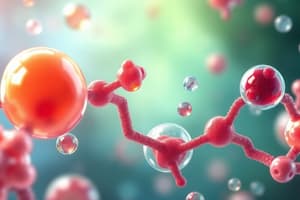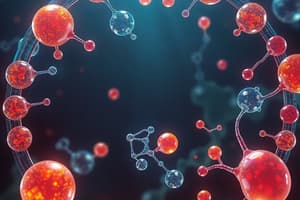Podcast
Questions and Answers
What are biomolecules?
What are biomolecules?
Biomolecules are complex molecules, including carbohydrates, proteins, nucleic acids, and hormones, that play essential roles in biological systems.
Which of the following is a characteristic of living systems?
Which of the following is a characteristic of living systems?
- They do not engage in chemical reactions.
- They can grow, sustain, and reproduce themselves. (correct)
- They are made entirely of organic compounds.
- They are composed of living cells only.
What are the primary products of carbohydrates?
What are the primary products of carbohydrates?
Carbohydrates are primarily produced by plants.
What is the general formula of carbohydrates?
What is the general formula of carbohydrates?
Acetic acid is classified as a carbohydrate.
Acetic acid is classified as a carbohydrate.
What are monosaccharides?
What are monosaccharides?
Which of the following is an example of a disaccharide?
Which of the following is an example of a disaccharide?
What defines oligosaccharides?
What defines oligosaccharides?
What is the most common sugar used in homes?
What is the most common sugar used in homes?
What term is used to refer to carbohydrates?
What term is used to refer to carbohydrates?
What are polysaccharides?
What are polysaccharides?
Flashcards are hidden until you start studying
Study Notes
Biomolecules
- Biomolecules are the building blocks of life and include carbohydrates, proteins, nucleic acids, lipids, vitamins, and mineral salts.
- They interact with each other and constitute the molecular logic of life processes.
- Biochemistry is the pursuit of knowledge regarding chemical processes within living systems.
Carbohydrates
- Carbohydrates are primarily produced by plants and form a very large group of naturally occurring organic compounds.
- Common examples include cane sugar, glucose, starch, lactose, sucrose, etc.
- Their general formula is Cx(H2O)y, and were considered as hydrates of carbon.
- They are defined as optically active polyhydroxy aldehydes or ketones or the compounds which produce such units on hydrolysis.
- Some carbohydrates, like sucrose and lactose, are sweet and called sugars.
Classification of Carbohydrates
- Carbohydrates are classified based on their hydrolysis behavior.
- Monosaccharides: Cannot be hydrolyzed further to give simpler units and are considered the building blocks of carbohydrates.
- Examples: glucose, fructose, ribose.
- Oligosaccharides: Yield two to ten monosaccharide units upon hydrolysis.
- Further classified based on the number of monosaccharides.
- Most common are disaccharides.
- Examples: Sucrose (glucose + fructose), maltose (glucose + glucose).
- Polysaccharides: Yield a large number of monosaccharide units upon hydrolysis.
- Examples: Starch, cellulose, glycogen.
Studying That Suits You
Use AI to generate personalized quizzes and flashcards to suit your learning preferences.




